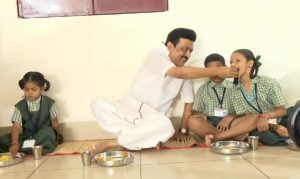The assessment of promises in a poll manifesto on the basis of the revenues of a state is not the duty of the EC.

File photo shows former Tamil Nadu chief minister M Karunanidhi releasing the DMK manifesto ahead of the 2016 polls. DMK leaders Durai Murugan, K Anbazhagan, TR Baalu, MK Stalin, and Kanimozhi are among those present (Twitter/ MK Stalin)
The Election Commission (EC) cannot, under the guise of strengthening the existing model code of conduct, seek minute details about electoral promises made by a political party to the people and methods of generation of the state’s resources for their fulfilment.
The EC communication, issued on 4 October, will not apply to loan waivers that are given to corporates or tax rebates for the rich. These would not be mentioned in the manifestos as such decisions do not fetch votes but are anyway implemented by some governments. Hence, they need not be mentioned in the standardised pro-forma that the EC seeks to add to the Model Code of Conduct (MCC).
Hence, the communication is biased as it will target only the welfare schemes meant for the poor and oppressed sections of society, students, farmers and agriculturists — policies that are meant for removing inequalities, uplifting the downtrodden, and fulfilling the Directive Principles of State Policy.
An election manifesto is a blueprint or a vision statement wherein a political party lays down the work it proposes to undertake if it comes to power.
The EC now wants details about “extant and expanse of coverage” of a promise, “availability of financial resources”, “ways and means of raising resources for meeting the additional expenditure to be incurred in fulfilling the promises”, “impact of the additional resource raising plan on the fiscal sustainability of the State or Union government”, etc.
How resources can be generated, how the pilferage of government revenue can be avoided, and how a state can be industrialised — these are all strategies that a political party can implement with its administration efficiency and good governance when it comes to power. These are all how parties can fulfil poll promises when voted to power and they need not disclose the methods or demonstrate them to the EC prior to elections.
That’s not the brief of the EC under the Constitution and The Representation of the People Act. In my opinion, the communication of the EC is without jurisdiction.
The DMK has always supported welfare schemes as a way towards social justice and the government led by the party in Tamil Nadu recently launched the first phase of the Chief Minister’s Free Breakfast Scheme, which aims to provide free nutritious breakfast for government-school students of Classes I–V on all working days.

MK Stalin said the scheme is the duty of the government, adding it aims to alleviate the burden of hunger during any financial crisis the state may face
(Supplied)
Amid the ‘revdi culture’ remark by the prime minister, the DMK impleaded itself in a case in the Supreme Court against the distribution of freebies by political parties using public funds and noted that there was “no straightjacket formula to decide what scheme could be considered a freebie”.
The manifesto is the right of expression of a political party. The manifesto is nothing but the reflection of the aspirations and expectations of the people and a political party’s commitment to them.
This manifesto is an unwritten contract that binds political parties with their promises made to the people. If the parties don’t implement the poll promises, they will not be elected again. The Constitution and existing Parliamentary legislations act as checks and balances with regard to the utilisation of funds by any party in power, both at the Centre and states.
The assessment of promises in a poll manifesto on the basis of the revenues of a state is not the duty of the EC.
The EC is not the Comptroller and Auditor General (CAG) to scrutinise revenue and expenditure. Any such exercise would affect the election process drastically and be disastrous to democracy.
(P Wilson is a senior advocate and Member of Parliament, Rajya Sabha (TN) from the DMK. He is a former additional solicitor general of India and former additional advocate general, Tamil Nadu. These are the personal views of the author)

May 06, 2024

May 06, 2024

May 06, 2024

May 06, 2024

May 06, 2024

May 06, 2024